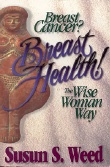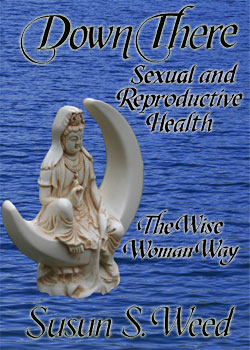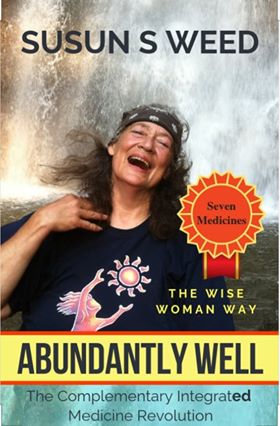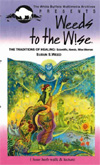www.susunweed.com
Herbal Adventures with Susun S Weed
The Artemisia genus
as seen printed in www.sagewoman.com
Green blessings surround us. Herbal medicine is people's medicine: free, simple, and accessible. Connect with the plants and you'll find yourself in love with the earth and your own wild nature. You don't need human language to learn about plants; when you live with the plants, they speak to you in your dreams and whisper in your womb.
But language and words are useful tools. Everyone, no matter what their mother tongue, uses the same plant language: the botanical or, more simply, the scientific names.
Scientific names may seem daunting, but your effort will be repaid a hundredfold. Plants in the same family often have very similar properties, allowing you to learn how to use hundreds of plants as quickly as learning how to use one.
In my last column, I introduced you to some of the 20,000 members of the Asteraceae family. This family, like all plant families, is sub-divided into groups called genera (plural). Each genus (singular) contains plants that are closely related, and usually interchangeable in use, though individually different. Each individual plant in a genus has the same first name, but a different second or species name. For instance, the genus Echinacea in the Asteraceae family includes E. pallida, E. purpurea, and E. augustifolia, all of which are powerful anti-infective agents.
Among the many genera in the Asteraceae family, one of my favorites is the Artemisia genus, named after the goddess Artemis. It contains many marvelously-aromatic, highly-medicinal, dazzlingly-decorative, safely-psychedelic, and more-or-less edible plants. Found in gardens, waysides, and waste lots throughout the world, there's probably an Artemisia growing near you.
Artemis is Apollo's sister, and Queen of the witches. She is the goddess of the moon, the herbalist, the midwife, the birthing woman, and the hunter. Artemis is an untamed wild woman who runs free with the deer and the hounds. She is the woman who runs with the wolves. She is "Mother of all Creatures." "Leader of the Sacred Bitches." "Great She-Bear." She is owned by no man, and thus she is "Forever Virgin." And the plants named after her share her qualities.
If you see an Artemisia growing beside the door -- or painted on it -- you've arrived at the home of an herbalist or a midwife, a home guarded by Artemis.
The silver light of Artemis's moon shines from the leaves of her plants, making them appear to be lightly frosted, or to glow subtly. Most Artemisias are perennials that are tolerant of drought, poor soil, and extremes of heat and cold, making them ideal allies for even the most novice of gardeners. Artemisias grow best from cuttings, or transplants, not seeds, with the exception of A. annua, Sweet Annie, which lives one year only and is grown from seed.
Artemisias produce hundreds of different aromatic oils, including camphor and thujone. This keeps them bug-free and provides us with medicines. Aromatic oils in fresh Artemisias may be extracted into vinegar, vodka, or fat such as olive oil and used externally to counter bacterial and fungal infections, and internally to prevent or cure digestive parasites in wo/man and beast. Small doses are said to improve appetite and digestion.
Dried Artemisias retain these oils and are frequently used to make long-lasting, aromatic bouquets, wreaths, and swags, as well as dream pillows, sachets, and magical charms. When dirt floors were common, Artemisias were popular as strewing herbs. And don't forget that all Artemisias are useful as smudges. Sagebrush, A. tridentata is the most famous of all smudges, but, for a change, try cronewort (A. vulgaris), the ally of dreamers.
Many books call Artemisia vulgaris "mugwort," a name she despises. "I give you the dreams of wise old women," she told me, "not the drunken fantasies of those with their noses in mugs. Can't you see my silver hair on the underside of every leaf?"
Tincture, vinegar (my favorite), or even a tea of cronewort can tonify and improve the urinary, digestive, hormonal, nervous, and circulatory systems. "I'm everything an old woman wants," she confides with a smile. "I comfort those who grieve; I stir those who are depressed. I remove irritability and ease burdened joints. I bring peace and sleep, rest and reassurance."
Cronewort is also beloved by midwives for easing the pain of labor, quelling menstrual cramps, and effectively treating heavy bleeding and other uterine complaints. And don't forget her "supernatural" powers! This most common (that's what "vulgaris" means) Artemisia is a powerful witch who will spin a spiraling spell for you -- if you ask her nicely.
Wormwood (A. absinthium) is perhaps the best known member of this genus. It is the strongest and most dangerous of the Artemisias. As the main ingredient in the mind-altering liquor absinthe, it stimulates mid-brain activity and increases creativity. (Repeated use disturbs the central nervous system, however; and overuse can lower seizure thresholds.) Herbalists like myself use tincture of fresh wormwood, 3-5 drops taken frequently throughout the day, to prevent giardia, dysentery, amoebas, and other parasitical infections. This bitter, bitter tincture is also useful to ease indigestion, improve liver function, and stimulate production of bile.
Sweet Annie (A. annua), known in China as qing hao, is becoming quite the star these days. Dried and used in large daily doses, this Artemisia can prevent malaria. Drug companies hope to isolate the active ingredient and produce a drug that will even cure malarias resistant to current drugs.
Invite Artemis into your garden -- or meet her in the wild places she loves. Open your heart, your head, and your womb to her. Invite her sexy beautiful green magic into your circle. It's easy and fun.
Some Artemisia species beloved by herbalists and gardeners
A. abrotanum (southernwood) -- divinatory
A. absinthium (wormwood) -- medicinal
A. afra (African wormwood) -- beauty
A. annua (sweet Annie, qing hao) -- medicinal
A. camphorata (camphor-scented sothernwood) -- divinatoryA. chinensis (moxa) -- medicinal
A. drancuncula (tarragon, little dragon) -- cook's favorite
A. frigida (fringed sagebrush) -- smudge
A. lactiflora (ghost plant) -- beauty
A. ludoviciana (silver queen) -- beauty
A. pontica (Roman wormwood) -- beauty
A. schmidtiana (silver mound) -- beauty
A. stellerana (old woman, dusty miller) -- beauty
A. tridentata (three-toothed sagebrush) -- smudge
A. vulgaris (cronewort, mugwort) -- magic and medicine
Dear Susun,
I hope you can help me understand more about the nutritional value of herbs and herbal infusions. I've always assumed that I needed to take supplements in order to insure that I was getting adequate nutrients. But I just read that a major study found that taking calcium supplements doesn't reduce the risk of breaking a bone. Can herbs really help?
Kristine in Ontario
Dear Kristine,
Vitamins and minerals coexist in foods and herbs with hundred of other constituents that cause them to be much more effective than any vitamin or mineral in a pill. Health has never come in a pill, and I doubt that it ever will.
Vitamins are groups of closely-related enzymes (proteins) that work together synergistically. Vitamin A includes over 1800 carotenes and carotinoides, vitamin B has about twenty different factors including niacin, folate, riboflavin, and laetrile, vitamin C includes more than one hundred substances in addition to ascorbic acid, vitamin D is found in at least three forms, and vitamin E contains eight different factors. Vitamins in pills are simplified versions of complex substances, so they can't promote health, although they can counter true deficiencies. Vitamin supplements, unlike the vitamins in foods and herbs, can cause harm. Supplementation with vitamin A has been found to increase a woman's risk of hip fracture. Supplementation with vitamin E can make breast cancer more lethal.
Minerals may seem simpler than vitamins, but they aren't. Elemental minerals cannot be used by living things; cells require the salt, or ionic, forms of minerals. There are hundreds of ionic forms of each mineral in foods and herbs but only one in a supplement. Once again, loss of complexity leads to less health, not more.
Nourishing herbal infusions -- made from non-poisonous herbs such as nettle, red clover, oatstraw, linden, and comfrey leaf -- provide complete vitamins and lots of mineral complexes along with synergistic activating compounds. You can't go by the numbers. I've maintained for decades that the nutrients in herbs and whole foods are at least ten times more active than those in supplements. A chemist recently challenged me on this. According to his research, the nutrients in foods and herbs are a thousand times more active than those in pills. One molecule of vitamin E in a pill can only absorb on free radical. A molecule of vitamin E in a cup of nettle infusion can absorb a thousand free radicals. If an herb has 100 mg of measurable calcium, it will actually have the effect of at least 1000 mg of calcium. Numbers don't tell the whole tale.
I don't take pills. I do drink 2-4 cups of nourishing herbal infusion daily; and include plenty of seaweed, yogurt, miso, cooked greens, whole grains, olive oil, and lacto-fermented vegetables (also known as sauerkraut) in my diet. My students report noticeable improvement in their health, skin, and hair after drinking nourishing infusions for as little as ten days. Over longer periods of time bone mass improves, immunity grows stronger, digestion becomes problem-free, and energy soars. (For instructions on making nourishing infusions, please visit my website or refer to any one of my books.)
Green blessings. Susun
Susun Weed
PO Box 64
Woodstock, NY 12498
Vibrant, passionate, and involved, Susun Weed has garnered an international reputation for her groundbreaking lectures, teachings, and writings on health and nutrition. She challenges conventional medical approaches with humor, insight, and her vast encyclopedic knowledge of herbal medicine. Unabashedly pro-woman, her animated and enthusiastic lectures are engaging and often profoundly provocative.
Susun is one of America's best-known authorities on herbal medicine and natural approaches to women's health. Her four best-selling books are recommended by expert herbalists and well-known physicians and are used and cherished by millions of women around the world. Learn more at www.susunweed.com
For permission to reprint this article, contact us at: www.ashtreepublishing.com/contactVisit Susun Weed at: www.susunweed.com and www.wisewomanbookshop.com
Susun Weed’s books include:
Wise Woman Herbal for the Childbearing Year
Author: Susun S. Weed.
Simple, safe remedies for pregnancy, childbirth, lactation, and newborns. Includes herbs for fertility and birth control. Foreword by Jeannine Parvati Baker. 196 pages, index, illustrations.
Order at: www.wisewomanbookshop.com
Healing Wise
Author: Susun S. Weed.
Superb herbal in the feminine-intuitive mode. Complete instructions for using common plants for food, beauty, medicine, and longevity. Introduction by Jean Houston. 312 pages, index, illustrations.
Order at: www.wisewomanbookshop.com

NEW Menopausal Years the Wise Woman Way
Author: Susun S. Weed.
The best book on menopause is now better. Completely revised with 100 new pages. All the remedies women know and trust plus hundreds of new ones. New sections on thyroid health, fibromyalgia, hairy problems, male menopause, and herbs for women taking hormones. Recommended by Susan Love MD and Christiane Northrup MD. Introduction by Juliette de Bairacli Levy. 304 pages, index, illustrations.
Order at: www.wisewomanbookshop.com
For excerpts visit: www.menopause-metamorphosis.com
Breast Cancer? Breast Health!
Author: Susun S. Weed.
Foods, exercises, and attitudes to keep your breasts healthy. Supportive complimentary medicines to ease side-effects of surgery, radiation, chemotherapy, or tamoxifen. Foreword by Christiane Northrup, M.D. 380 pages, index, illustrations.
Order at: www.wisewomanbookshop.com
Down There: Sexual and Reproductive Health the Wise Woman Way
Publication date: June 21, 2011
Author: Susun S. Weed
Simple, successful, strategies cover the entire range of options -- from mainstream to radical -- to help you choose the best, and the safest, ways to optimize sexual and reproductive health. Foreword: Aviva Romm, MD, midwife, 484 pages, Index, illustrations.
Order at: www.wisewomanbookshop.com
Abundantly Well - Seven Medicines The Complementary Integrated Medical Revolution
Publication date: December 2019
Author: Susun S. Weed
Seven Medicines build foundational health and guide you to the best health care when problems arise. Includes case studies, recipes, exentsive references and resources. Introduction by Patch Adams illustrated by Durga Yael Bernhard 352 pages, index, illustrations
Order at: www.wisewomanbookshop.com
Susun Weed's Video & CD's:Weeds to the Wise DVD Video
Visit Susun's farm for a weed walk. Hear her talk on the Three Traditions of Healing. Make infusion with her. Fun! (1 hour VHS video) Please note: this VHS video tape is in NTSC format which may not be compatible with video players outside of the USA and Canada.
Order at: www.wisewomanbookshop.com
Susun Weed's "It's Time"
Wise Woman Center
25th Anniversary Celebration CD
GODDESS CHANTS CD
Visit www.goddesschants.com to hear all the songs, read lyrics &
learn about the artists.
18 Wise Woman Songs & Chants from the heart
Susun Weed's Audio CD Series
~ Elements of Herbalism: Harvesting - 2 CD set
~ Elements of Herbalism: Dosage - 3 CD set
~ My Ally Motherwort - 2 CD set
~ Triple Goddess Herbs - 1 CD
~ The Cervix: Gateway to Life - 1 CD
~ Healthy Bones The Wise Women Way - 2 CD set
~ My Herbal Medicine Chest - 3 CD set
~ Herbal Mouth Care The Wise Women Way - 2 CD set
~ Magical Plants INTENSIVE - 3 CD set
~ Chronic Problems the Wise Woman Way - 2 CD set
For Wholesale orders see our terms letter or contact us at:
Ash Tree Publishing PO Box 64 Woodstock, NY 12498 ~
Website: www.wisewomanbookshop.com ~
Susun Weed, green witch and wise woman, is an extraordinary teacher with a joyous spirit, a powerful presence, and an encyclopedic knowledge of herbs and health. She is the voice of the Wise Woman Way, where common weeds, simple ceremony, and compassionate listening support and nourish health/wholeness/holiness. She has opened hearts to the magic and medicine of the green nations for three decades. Ms. Weed's Six herbal medicine books focus on women's health topics including: menopause, childbearing, and breast health. Visit her site www.susunweed.com for information on her workshops, apprenticeships, correspondence courses and more! Venture into the Menopause site www.menopause-metamorphosis.com to learn all about the Menopausal Years the Wise Woman Way.
Join Susuns Mentorship site for personal one on one mentorship! We also invite you to visit our commerce site www.wisewomanbookshop.com to learn about our Wise Woman publications, workshops, correspondence courses. As well as online courses at Wise Woman School.
back to articles index
back to press kit
© Susun Weed -Wise Woman Center
~ Disclaimer & Privacy Policy ~








